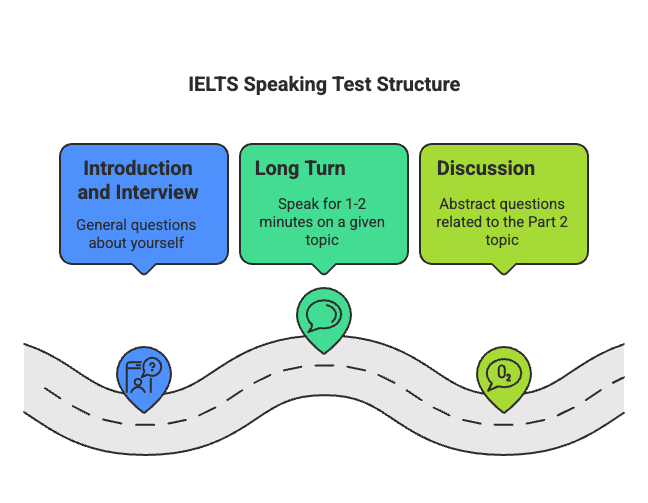Top FAQs: IELTS Speaking Test | Speaking for IELTS PDF Download
The IELTS Speaking Test is a key part of the exam that assesses your spoken English ability in real-life situations. It is the same for both Academic and General Training test takers. Below are the most frequently asked questions to help you understand the format, scoring, and best preparation strategies.
1. What is the IELTS Speaking Test?
The IELTS Speaking Test is a face-to-face interview with a certified examiner. It lasts 11–14 minutes and is designed to assess how well you can communicate in English through a conversation.
2. How many parts are there in the Speaking Test?
There are three parts:
Part 1: Introduction and Interview (4–5 minutes) – General questions about yourself.
Part 2: Long Turn (3–4 minutes) – You speak for 1–2 minutes on a given topic.
Part 3: Discussion (4–5 minutes) – Abstract questions related to the Part 2 topic.

3. Is the Speaking test the same for Academic and General IELTS?
Yes. The Speaking section is identical for both versions of the IELTS exam. The questions and scoring criteria are the same.
4. Who conducts the test?
The test is conducted by a real, certified IELTS examiner, either in person or via a video call. The entire session is recorded for quality and review purposes.
5. Can I ask the examiner to repeat a question?
Yes. If you don’t understand a question, it’s perfectly acceptable to ask the examiner to repeat or rephrase it. However, overuse of this may affect your fluency score.
6. Can I use informal language?
Yes—especially in Part 1, which is more casual. However, it’s important to balance natural conversation with appropriate vocabulary and tone. Avoid slang, and don’t be too informal in Parts 2 and 3.
7. Will I be penalised for having an accent?
No. IELTS does not penalise you for your accent as long as your speech is clear and understandable. Pronunciation is scored based on clarity, intonation, and correct word stress.
8. How is the Speaking test scored?
You are graded on four equal criteria:
Fluency and Coherence
Lexical Resource (Vocabulary)
Grammatical Range and Accuracy
Pronunciation
Each is scored from Band 0 to 9, and the average of the four becomes your final Speaking score.
9. Can I see the cue card before the test?
No. The cue card in Part 2 is given to you during the test, and you are given 1 minute to prepare, along with paper and a pencil to make notes.
10. What should I do if I go blank during the test?
Take a deep breath, use filler phrases like “That’s an interesting question” or “Let me think about that for a moment”, and try to continue. Examiners understand nerves but want to see how you recover and keep speaking.
11. Should I memorise answers before the test?
No. Memorised answers are easy to identify and can reduce your score for fluency and coherence. It's better to practice expressing ideas naturally with a variety of vocabulary and sentence structures.
12. Do I need to speak for the full 2 minutes in Part 2?
You should aim to speak for as close to 2 minutes as possible. The examiner will stop you if you exceed the time. Speaking too briefly may suggest limited fluency or vocabulary.
13. Can I ask for a different topic in Part 2?
No. You must respond to the topic on the cue card. All topics are general and do not require special knowledge, so do your best to speak based on your experiences and ideas.
14. Can I make grammatical mistakes and still score well?
Yes. Minor grammar mistakes will not significantly affect your score if your message is clear, and you demonstrate a range of sentence types and good control overall. Accuracy and variety both matter.
15. How can I prepare for the Speaking test?
Practice speaking daily with friends or teachers.
Record yourself and review your fluency and pronunciation.
Expand your vocabulary by discussing common IELTS topics (e.g., environment, education, technology).
Work on structuring your answers clearly and confidently.
Take mock speaking tests under timed conditions.
|
33 videos|169 docs
|
FAQs on Top FAQs: IELTS Speaking Test - Speaking for IELTS
| 1. What is the IELTS Speaking Test format? |  |
| 2. How is the IELTS Speaking Test scored? |  |
| 3. How can I prepare for the IELTS Speaking Test? |  |
| 4. What should I expect on the day of the IELTS Speaking Test? |  |
| 5. Can I use notes during the IELTS Speaking Test? |  |
















